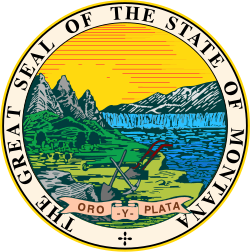| |||||||||||||||||||||||||||||||||||
| |||||||||||||||||||||||||||||||||||
 County results Mitt Romney Ron Paul John McCain Mike Huckabee Tie | |||||||||||||||||||||||||||||||||||
| Elections in Montana |
|---|
 |
The 2008 Montana Republican presidential caucuses took place on February 5, 2008, with 25 national delegates. [1] The first caucuses were scheduled for midday in Sheridan County and Judith Basin County.
Contents
In the fall of 2007, Montana's Republican Party decided to create a caucus for Super Tuesday. They hoped to "boost the state's profile among the campaigns and energize the party." In spite of this change, only one presidential candidate actually visited Montana, Mitt Romney in June 2007. McCain, Romney, Huckabee and Paul each orchestrated last-minute conference calls with voters at caucus sites. [2]



